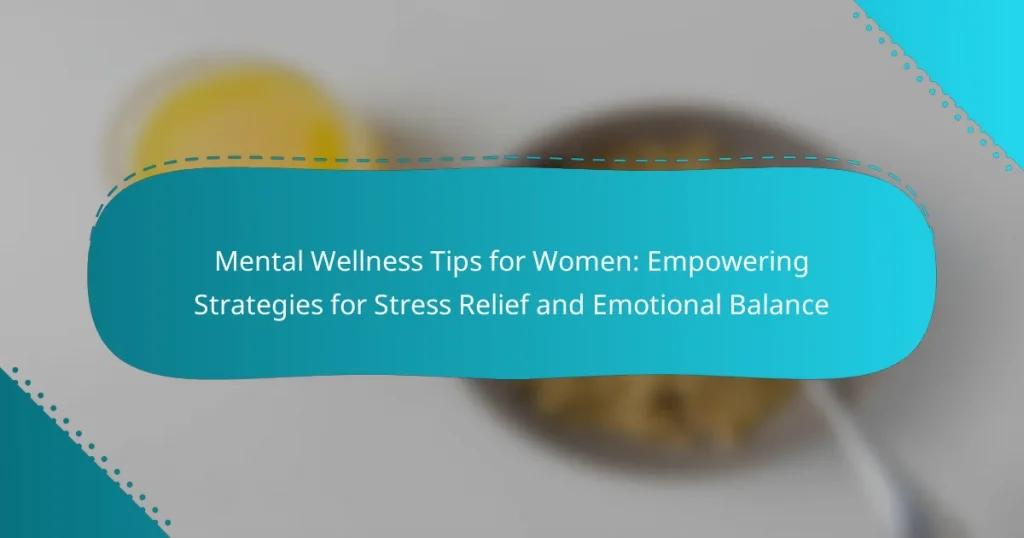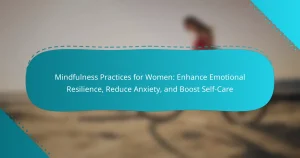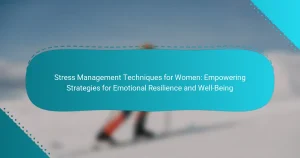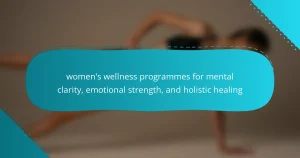Women often face unique challenges that can impact their mental wellness. Mindfulness practices can enhance focus and reduce anxiety. Regular physical activity boosts mood and overall mental health. Strong social connections provide essential support and reduce isolation, while prioritising self-care routines nurtures emotional balance.
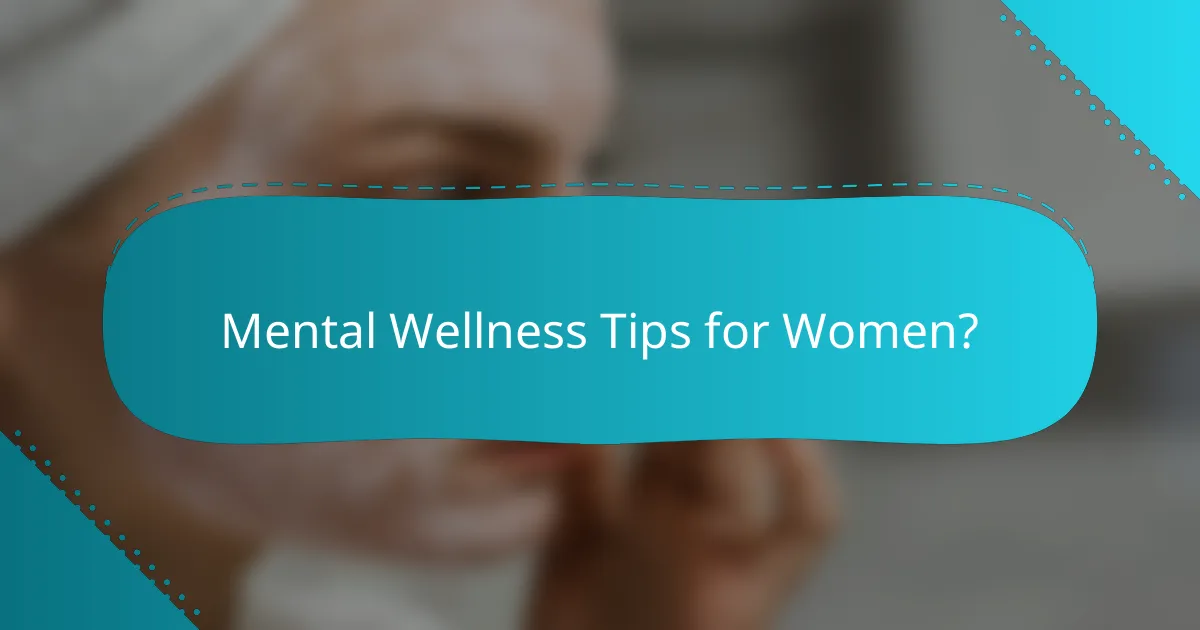
Mental Wellness Tips for Women?
Mental wellness tips for women include mindfulness practices, physical activity, and fostering social connections. These strategies promote stress relief and emotional balance.
1. Practice mindfulness through meditation or deep breathing exercises to enhance focus and reduce anxiety.
2. Engage in regular physical activity to boost mood and improve overall mental health.
3. Cultivate strong social connections by spending time with friends and family, which can provide support and reduce feelings of isolation.
4. Prioritise self-care routines, such as adequate sleep, healthy eating, and engaging in hobbies, to nurture mental well-being.
5. Seek professional help when needed, as therapy can provide valuable tools and insights for managing mental health challenges.
Why is mental wellness important for women?
Mental wellness is crucial for women as it directly impacts overall health and quality of life. Women often face unique stressors, including societal pressures and health concerns. Prioritising mental wellness enhances emotional balance, reduces stress, and fosters resilience. Studies show women are more likely to experience anxiety and depression, making mental wellness strategies essential. Implementing effective coping mechanisms can lead to improved relationships and productivity, ultimately empowering women to thrive.
What are common mental health challenges faced by women?
Women commonly face mental health challenges such as anxiety, depression, stress, and body image issues. These challenges can stem from societal pressures, hormonal changes, and life transitions. Research indicates that women are twice as likely as men to experience anxiety disorders. Additionally, postpartum depression affects about 15% of new mothers, highlighting the unique mental health risks associated with motherhood. Addressing these challenges through support networks and self-care strategies is essential for emotional balance.

What are universal strategies for stress relief?
To relieve stress, women can adopt universal strategies that promote mental wellness and emotional balance. Effective techniques include mindfulness practices, physical activity, and social support. Mindfulness, such as meditation or deep breathing, helps centre thoughts and reduce anxiety. Regular exercise boosts mood and energy levels, while connecting with friends or family provides essential emotional support. Prioritising self-care, such as adequate sleep and healthy nutrition, further enhances resilience against stress.
How can physical activity improve mental wellness?
Physical activity significantly enhances mental wellness by reducing stress, anxiety, and depression. Engaging in regular exercise releases endorphins, which boost mood and promote emotional balance. Studies show that even moderate physical activity can lead to improved cognitive function and resilience against stressors. Women can benefit from activities like yoga, walking, or group fitness classes, fostering a sense of community and support. These strategies empower women to manage stress effectively and maintain emotional well-being.
What types of exercise are most beneficial?
Regular exercise significantly enhances mental wellness for women. Effective types include aerobic activities, strength training, yoga, and mindfulness practices. Aerobic exercises, such as running or cycling, improve mood and reduce anxiety. Strength training builds resilience and confidence. Yoga promotes relaxation and emotional balance. Mindfulness practices, like tai chi, enhance focus and reduce stress. Engaging in a variety of these exercises can lead to improved emotional health and stress relief.
What role does nutrition play in emotional balance?
Nutrition significantly influences emotional balance by providing essential nutrients that support brain function and mood regulation. A balanced diet rich in omega-3 fatty acids, vitamins, and minerals can reduce stress and anxiety. For example, foods like fatty fish, leafy greens, and nuts contribute to improved mental health. Additionally, maintaining stable blood sugar levels through regular meals can enhance mood stability. A unique attribute of nutrition in this context is its role in neurotransmitter synthesis, which directly affects emotional well-being.
Which foods enhance mood and reduce stress?
Foods that enhance mood and reduce stress include dark chocolate, fatty fish, berries, nuts, and leafy greens. These foods contain nutrients that support brain health and emotional well-being.
Dark chocolate contains flavonoids that improve mood and reduce stress hormones. Fatty fish, rich in omega-3 fatty acids, can lower anxiety levels. Berries provide antioxidants that combat oxidative stress. Nuts are high in magnesium, which regulates mood, while leafy greens are packed with folate, essential for serotonin production.
Incorporating these foods into daily meals can significantly contribute to mental wellness. Aim for a balanced diet that includes these mood-enhancing options to support emotional balance and stress relief.
How can sleep hygiene contribute to mental health?
Sleep hygiene significantly enhances mental health by promoting restorative sleep, which is crucial for emotional balance. Good sleep practices, such as maintaining a consistent sleep schedule and creating a calming bedtime routine, can reduce stress and anxiety levels. Research indicates that quality sleep improves cognitive function and mood regulation, which are vital for mental wellness. Adopting effective sleep hygiene can empower women to manage stress and achieve emotional stability.
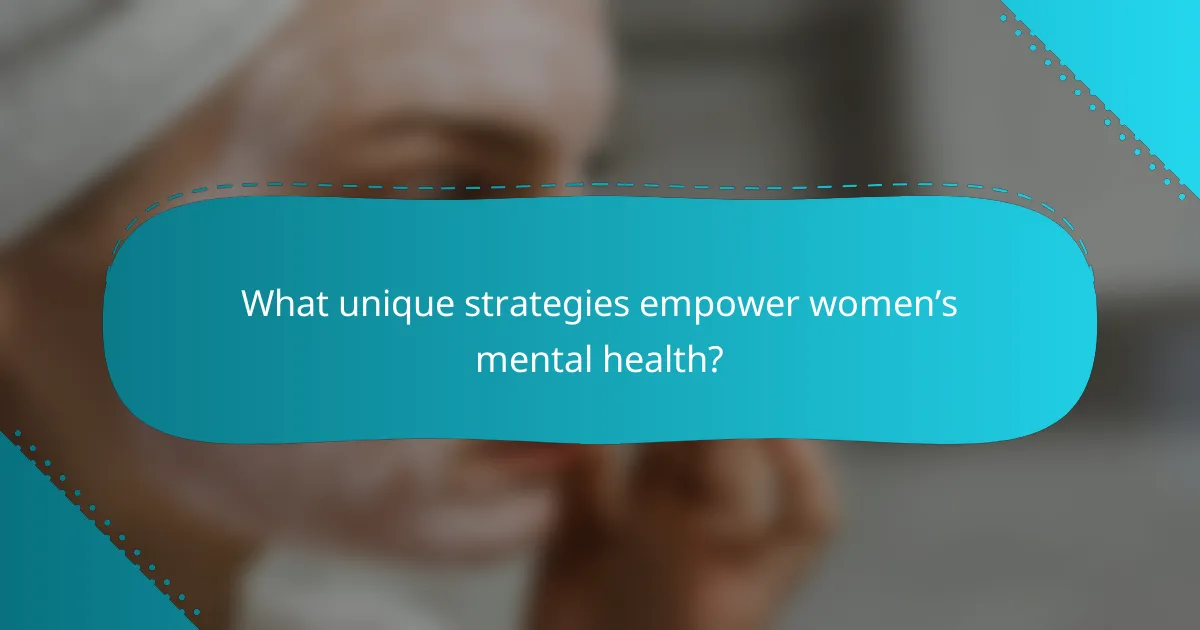
What unique strategies empower women’s mental health?
Unique strategies that empower women’s mental health include mindfulness practices, social support networks, and physical activity. Mindfulness techniques, such as meditation and deep breathing, enhance emotional regulation. Social support from friends and family fosters resilience, while regular physical activity releases endorphins, improving mood. Incorporating these strategies can significantly reduce stress and promote emotional balance, leading to better overall mental wellness for women.
How can community support enhance emotional well-being?
Community support significantly enhances emotional well-being by fostering connections and reducing feelings of isolation. Engaging with supportive networks provides women with shared experiences and resources. Studies show that social interaction can lower stress levels and improve mental health outcomes. Additionally, community initiatives often offer workshops and activities that promote emotional balance, empowering women to develop coping strategies.
What are effective coping mechanisms for women?
Effective coping mechanisms for women include mindfulness practices, physical activity, social support, and creative expression. Mindfulness techniques, such as meditation and deep breathing, enhance emotional regulation. Regular exercise boosts mood and reduces anxiety. Building a strong support network fosters connection and resilience. Engaging in creative activities serves as an emotional outlet, promoting mental wellness.
How can journaling facilitate emotional processing?
Journaling enhances emotional processing by providing a safe space for reflection and self-expression. It allows women to articulate feelings, clarify thoughts, and gain insights into their emotional experiences. Research indicates that writing about emotions can reduce stress and improve mental clarity, facilitating emotional balance. Regular journaling can lead to increased self-awareness, helping women identify patterns in their emotional responses. This practice serves as a unique tool for managing stress, ultimately empowering women to navigate their emotional landscapes more effectively.
What mindfulness techniques are effective for women?
Mindfulness techniques effective for women include meditation, deep breathing, and body scan practices. These methods enhance emotional balance and reduce stress. Research shows that women benefit from mindfulness through improved mental clarity and emotional regulation. Regular practice can lower anxiety levels and promote overall mental wellness.
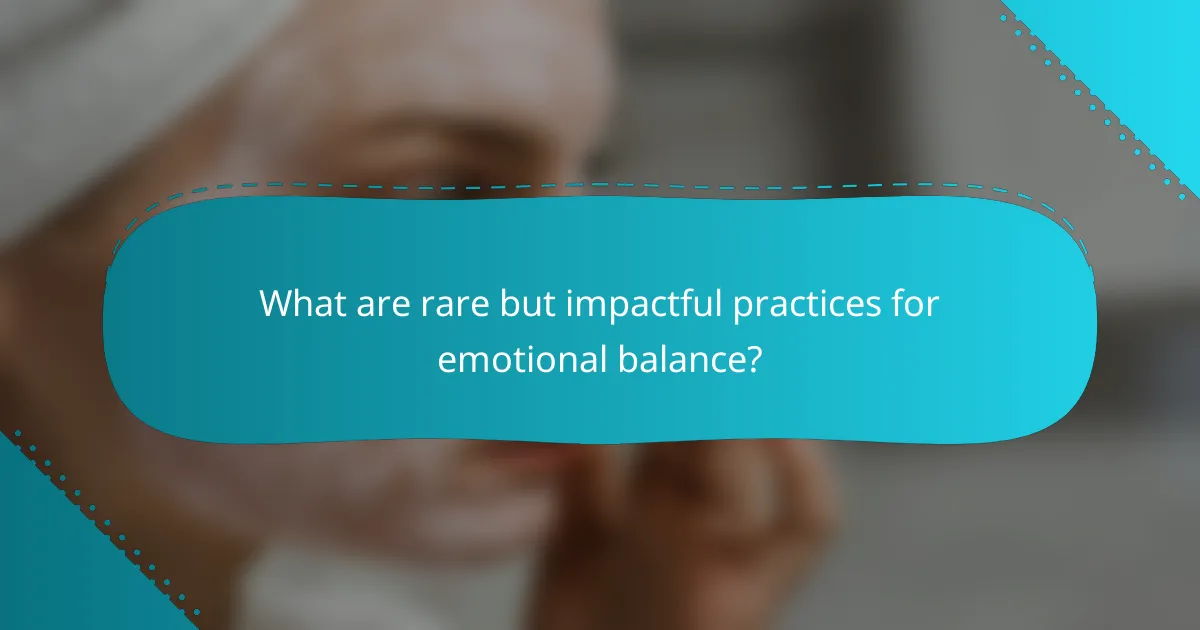
What are rare but impactful practices for emotional balance?
Practices like forest bathing, expressive writing, and sound therapy are rare but impactful for emotional balance. Forest bathing, or immersing oneself in nature, reduces stress and enhances mood. Expressive writing helps process emotions and fosters clarity, while sound therapy uses frequencies to promote relaxation and emotional healing. Incorporating these practices can significantly improve mental wellness for women seeking stress relief.
How does art therapy benefit women’s mental health?
Art therapy significantly enhances women’s mental health by promoting self-expression and emotional processing. It reduces anxiety and depression, fostering a sense of empowerment. Studies show that art therapy can lead to a 70% decrease in distress levels among women. Additionally, it encourages social interaction, which is vital for emotional balance. This unique therapeutic approach allows women to explore their feelings creatively, contributing to improved overall mental wellness.
What is the role of nature in mental wellness?
Nature plays a vital role in mental wellness by promoting relaxation and reducing stress. Exposure to natural environments can enhance mood and emotional balance. Studies show that spending time outdoors lowers cortisol levels and improves overall mental health. Engaging with nature, even through simple activities like walking in a park, fosters a sense of connection and well-being. This unique attribute of nature’s influence on mental wellness highlights its importance for women seeking effective stress relief strategies.
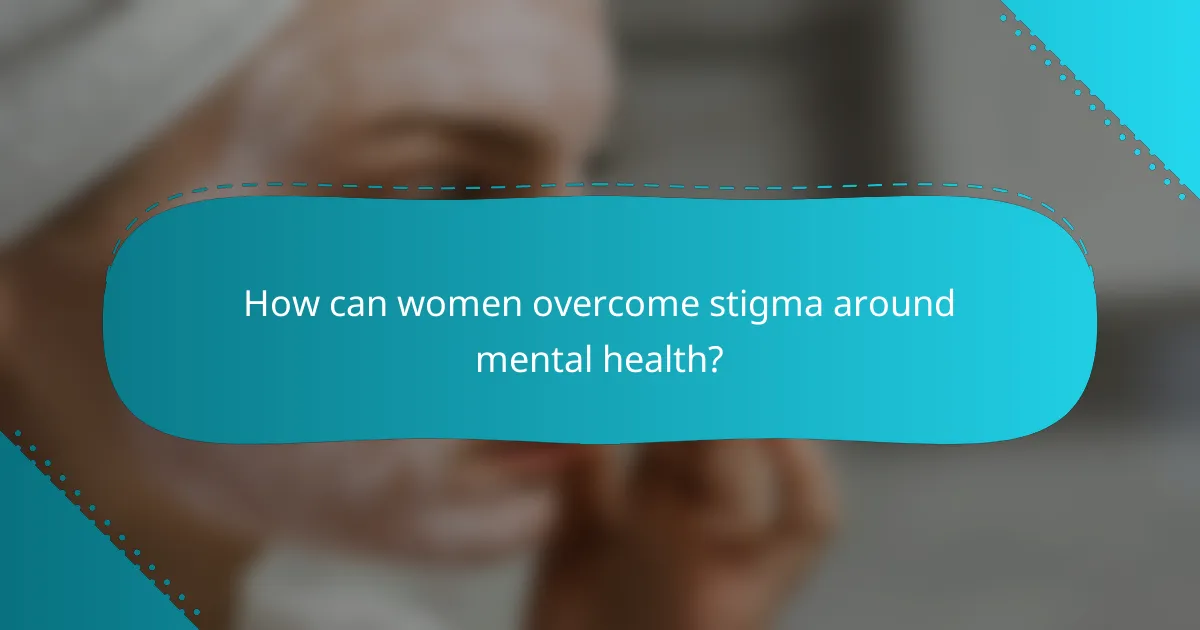
How can women overcome stigma around mental health?
Women can overcome stigma around mental health by fostering open conversations and seeking supportive communities. Engaging in mental wellness practices, such as mindfulness and self-care, empowers women to prioritise their emotional balance. Education about mental health can dispel myths and build understanding. Sharing personal experiences can also normalise discussions, creating a supportive environment. Establishing strong support networks enhances resilience and encourages women to seek help when needed.
What are the best practices for advocating mental wellness?
To advocate for mental wellness, prioritise self-care, establish supportive networks, and practice mindfulness. Incorporate regular exercise, balanced nutrition, and adequate sleep to enhance emotional balance. Engage in open discussions about mental health to reduce stigma and promote awareness. Utilise resources like therapy and support groups for additional guidance.
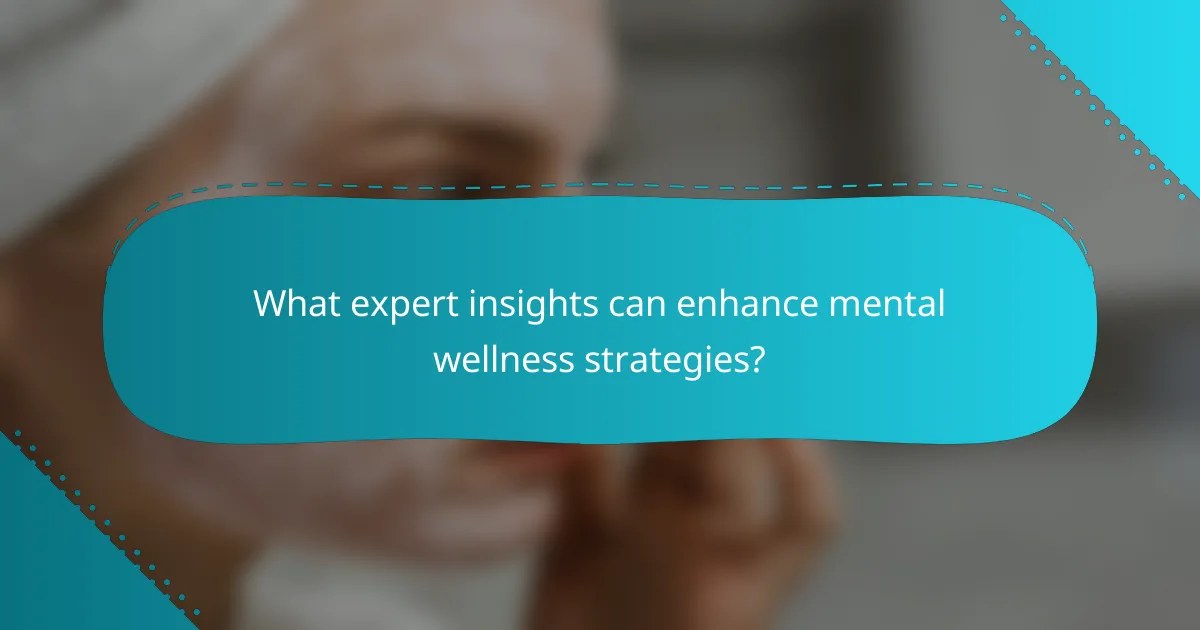
What expert insights can enhance mental wellness strategies?
Expert insights emphasise holistic approaches to mental wellness. Strategies such as mindfulness practices, regular physical activity, and social connections enhance emotional balance and stress relief. Research shows that women who engage in mindfulness techniques report lower stress levels and improved emotional health. Additionally, incorporating routine exercise can significantly boost mood and reduce anxiety. Social support networks are crucial; studies indicate that women with strong relationships experience better mental wellness outcomes. Prioritising self-care and setting boundaries also play vital roles in maintaining emotional balance.
What common mistakes should women avoid in their wellness journey?
Women should avoid neglecting self-care, comparing themselves to others, and dismissing professional help in their wellness journey. Prioritising self-care is essential for mental wellness and emotional balance. Many women mistakenly believe they need to handle everything alone, which can lead to burnout. Comparing one’s journey to others can create unrealistic expectations, hindering progress. Seeking professional help, such as therapy, is crucial for addressing deeper issues and gaining effective coping strategies. Embracing these practices fosters resilience and promotes overall well-being.
What are the top optimisation tips for maintaining emotional balance?
To maintain emotional balance, prioritise self-care, establish boundaries, and practice mindfulness. Incorporate regular physical activity and maintain a supportive social network. Engage in hobbies that bring joy and set realistic goals to foster a sense of accomplishment.
